hear等词的用法
动词hear的相关用法与语法
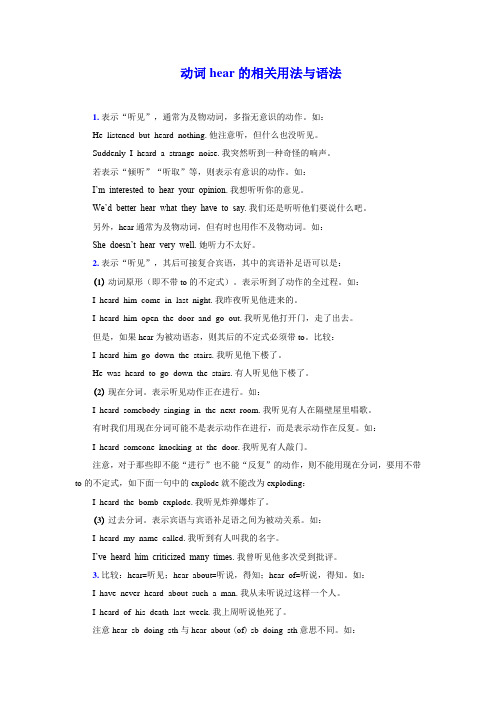
动词hear的相关用法与语法1.表示“听见”,通常为及物动词,多指无意识的动作。
如:He listened but heard nothing. 他注意听,但什么也没听见。
Suddenly I heard a strange noise. 我突然听到一种奇怪的响声。
若表示“倾听”“听取”等,则表示有意识的动作。
如:I’m interested to hear your opinion.我想听听你的意见。
We’d better hear what they have to say.我们还是听听他们要说什么吧。
另外,hear 通常为及物动词,但有时也用作不及物动词。
如:She doesn’t hear very well.她听力不太好。
2.表示“听见”,其后可接复合宾语,其中的宾语补足语可以是:(1)动词原形(即不带to的不定式)。
表示听到了动作的全过程。
如:I heard him come in last night. 我昨夜听见他进来的。
I heard him open the door and go out. 我听见他打开门,走了出去。
但是,如果hear为被动语态,则其后的不定式必须带to。
比较:I heard him go down the stairs. 我听见他下楼了。
He was heard to go down the stairs. 有人听见他下楼了。
(2)现在分词。
表示听见动作正在进行。
如:I heard somebody singing in the next room. 我听见有人在隔壁屋里唱歌。
有时我们用现在分词可能不是表示动作在进行,而是表示动作在反复。
如:I heard someone knocking at the door. 我听见有人敲门。
注意,对于那些即不能“进行”也不能“反复”的动作,则不能用现在分词,要用不带to的不定式,如下面一句中的explode就不能改为exploding:I heard the bomb explode. 我听见炸弹爆炸了。
hear等词的用法
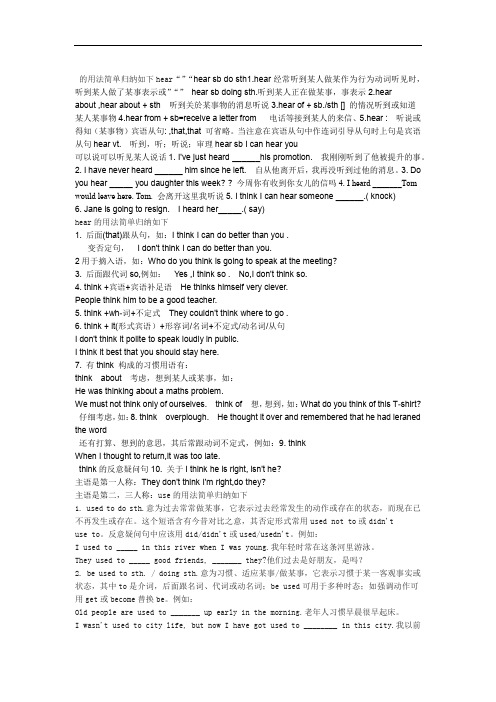
的用法简单归纳如下hear“”“hear sb do sth1.hear经常听到某人做某作为行为动词听见时,听到某人做了某事表示或”“”hear sb doing sth.听到某人正在做某事,事表示2.hearabout ,hear about + sth 听到关於某事物的消息听说3.hear of + sb./sth [] 的情况听到或知道某人某事物4.hear from + sb=receive a letter from 电话等接到某人的来信、5.hear : 听说或得知(某事物)宾语从句: ,that,that 可省略。
当注意在宾语从句中作连词引导从句时上句是宾语从句hear vt. 听到,听;听说;审理hear sb I can hear you可以说可以听见某人说话1. I've just heard ______his promotion. 我刚刚听到了他被提升的事。
2. I have never heard ______ him since he left. 自从他离开后,我再没听到过他的消息。
3. Do you hear _____ you daughter this week? ? 今周你有收到你女儿的信吗4. I heard _______Tom would leave here. Tom.会离开这里我听说5. I think I can hear someone ______.( knock)6. Jane is going to resign. I heard her_____.( say)hear的用法简单归纳如下1. 后面(that)跟从句,如:I think I can do better than you .变否定句,I don't think I can do better than you.2用于摘入语,如:Who do you think is going to speak at the meeting?3. 后面跟代词so,例如:Yes ,I think so . No,I don't think so.4. think +宾语+宾语补足语He thinks himself very clever.People think him to be a good teacher.5. think +wh-词+不定式They couldn't think where to go .6. think + it(形式宾语)+形容词/名词+不定式/动名词/从句I don't think it polite to speak loudly in public.I think it best that you should stay here.7. 有think 构成的习惯用语有:think about 考虑,想到某人或某事,如:He was thinking about a maths problem.We must not think only of ourselves. think of 想,想到,如:What do you think of this T-shirt? 仔细考虑,如:8. think overplough. He thought it over and remembered that he had leraned the word还有打算、想到的意思,其后常跟动词不定式,例如:9. thinkWhen I thought to return,it was too late.think的反意疑问句10. 关于I think he is right, isn't he?主语是第一人称:They don't think I'm right,do they?主语是第二,三人称:use的用法简单归纳如下1. used to do sth.意为过去常常做某事,它表示过去经常发生的动作或存在的状态,而现在已不再发生或存在。
高考感官动词用法总结

高考感官动词用法总结在高考英语中,感官动词是一个重要的语法点。
掌握好感官动词的用法,对于理解和运用英语语言有着重要的意义。
下面我们就来详细总结一下高考中常见的感官动词用法。
一、常见的感官动词常见的感官动词有:see(看见)、watch(观看)、look at(看)、hear(听见)、listen to(听)、feel(感觉)、smell(闻)、taste(尝)等。
二、感官动词的用法1、感官动词+宾语+宾语补足语(1)感官动词+宾语+ do(表示动作的全过程,强调结果或经常性的动作)例如:I saw him cross the road(我看见他过了马路。
)We often hear her sing in the room(我们经常听见她在房间里唱歌。
)(2)感官动词+宾语+ doing(表示动作正在进行)例如:I saw him crossing the road when I passed by(我路过时看见他正在过马路。
)I heard her singing in the room at that time(那时我听见她正在房间里唱歌。
)(3)感官动词+宾语+ done(表示宾语与宾语补足语之间是被动关系)例如:I saw the window broken(我看见窗户被打破了。
)We found the tree cut down(我们发现树被砍倒了。
)2、感官动词+宾语从句例如:I saw that he crossed the road safely(我看见他安全地过了马路。
)She heard that someone was knocking at the door(她听见有人在敲门。
)3、感官动词的被动语态感官动词在被动语态中,其后的宾语补足语要用带 to 的不定式。
例如:He was seen to cross the road(有人看见他过了马路。
)The girl was heard to sing in the room(有人听见这个女孩在房间里唱歌。
英语中的感官动词的用法
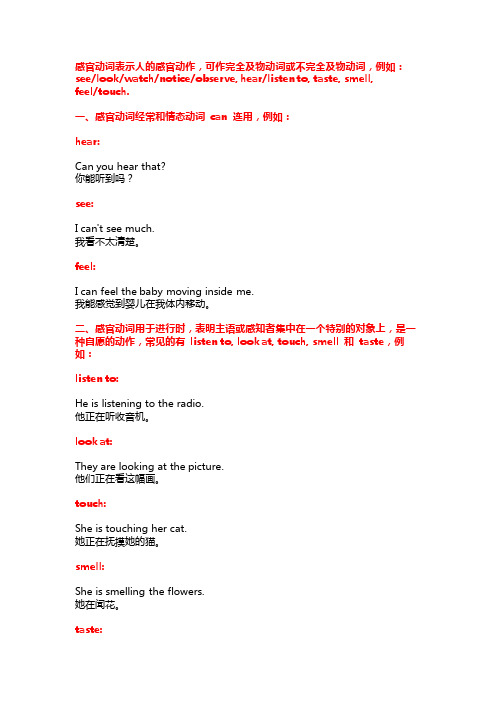
感官动词表示人的感官动作,可作完全及物动词或不完全及物动词,例如:see/look/watch/notice/observe, hear/listen to, taste, smell,feel/touch.一、感官动词经常和情态动词can 连用,例如:hear:Can you hear that?你能听到吗?see:I can't see much.我看不太清楚。
feel:I can feel the baby moving inside me.我能感觉到婴儿在我体内移动。
二、感官动词用于进行时,表明主语或感知者集中在一个特别的对象上,是一种自愿的动作,常见的有listen to, look at, touch, smell 和taste,例如:listen to:He is listening to the radio.他正在听收音机。
look at:They are looking at the picture.他们正在看这幅画。
touch:She is touching her cat.她正在抚摸她的猫。
smell:She is smelling the flowers.她在闻花。
taste:We are tasting champagne.我们正在品尝香槟。
并不是所有的感官动词都可以用进行时,例如:误:She was hearing a noise.误:He was seeing a woman in the rain.但当hear 在表达一种经历时,可以用进行时;see 在表达与人见面或是约会,可以用进行时,等等,例如:hearing:She was always hearing voices in her head.她脑子里总有声音。
seeing:She is seeing the doctor.她正在看医生。
He was seeing another woman.他在和另一个女人约会。
hear等词的用法

hear的用法简单归纳如下1、hear作为行为动词听见时,hear sb do sth表示“听到某人做了某事”或“经常听到某人做某事”,hear sb doing sth、表示“听到某人正在做某事”2、hear about 听说,hear about + sth 听到关於某事物的消息3、hear of + sb、/sth 听到或知道某人[某事物]的情况4、hear from + sb=receive a letter from 接到某人的来信、电话等5、hear 宾语从句: 听说或得知(某事物)注意: 上句就是宾语从句,当that在宾语从句中作连词引导从句时,that可省略。
hear vt、听到,听;听说;审理hear sb可以听见某人说话可以说I can hear you1、I've just heard ______his promotion、我刚刚听到了她被提升的事。
2、I have never heard ______ him since he left、自从她离开后,我再没听到过她的消息。
3、Do you hear _____ you daughter this week? 今周您有收到您女儿的信不?4、I heard _______Tom would leave here、我听说Tom会离开这里、5、I think I can hear someone ______、( knock)6、Jane is going to resign、I heard her_____、( say)hear的用法简单归纳如下1、后面(that)跟从句,如:I think I can do better than you 、变否定句, I don't think I can do better than you、2用于摘入语,如:Who do you think is going to speak at the meeting?3、后面跟代词so,例如: Yes ,I think so 、No,I don't think so、4. think +宾语+宾语补足语He thinks himself very clever、People think him to be a good teacher、5. think +wh-词+不定式They couldn't think where to go 、6. think + it(形式宾语)+形容词/名词+不定式/动名词/从句I don't think it polite to speak loudly in public、I think it best that you should stay here、7、有think 构成的习惯用语有:think about 考虑,想到某人或某事,如:He was thinking about a maths problem、think of 想,想到,如: We must not think only of ourselves、What do you think of this T-shirt?8、think over仔细考虑,如:He thought it over and remembered that he had leraned the word "plough"、9、think 还有打算、想到的意思,其后常跟动词不定式,例如:When I thought to return,it was too late、10. 关于think的反意疑问句主语就是第一人称:I think he is right, isn't he?主语就是第二,三人称:They don't think I'm right,do they?use的用法简单归纳如下1、 used to do sth、意为"过去常常做某事",它表示过去经常发生的动作或存在的状态,而现在已不再发生或存在。
hear用法

hear用法hear用法:hear作为一个动词,可以表示“听到,听见”的意思,可以用来描述物体或声音,也可以用来描述人说话。
一、hear用作实义动词,后接名词,表示“听到,听见”,常用于间接引语中,其结构为:hear+名词/代词+that(从句)。
如:I heard that she was going to marry him.我听说她要嫁给他。
He heard the news from his mother.他从他母亲那里听到了这个消息。
二、hear用作实义动词,后接动词不定式,表示“听到,听见”,其结构为:hear+sb. + doing sth.。
如:We heard her singing in the next room.我们听到她在隔壁房间唱歌。
I heard the dog barking in the garden.我听到花园里有狗在叫。
三、hear用作实义动词,后接形容词/副词,表示“听见某种声音”,其结构为:hear+形容词/副词。
如:I heard voices coming from the house.我听到从屋子里传出的声音。
We could hear someone shouting outside.我们能听见外面有人在喊叫。
四、hear用作实义动词,后接介词短语,表示“听到某种声音”,其结构为:hear+介词短语。
如:We heard a noise coming from the kitchen.我们听到厨房里传来的噪音。
I heard someone laughing behind me.我听到身后有人在笑。
五、hear用作系动词,后接形容词/名词,表示“听到某种声音”,其结构为:hear+形容词/名词。
如:We heard loud music coming from the room.我们听到房间里传来的大声音乐。
I heard lovely singing from the balcony.我听到阳台上发出的可爱的歌声。
hear等词的用法
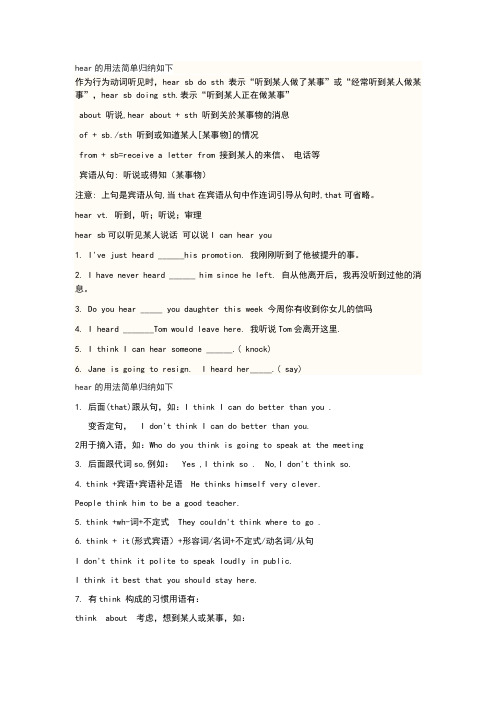
hear的用法简单归纳如下作为行为动词听见时,hear sb do sth表示“听到某人做了某事”或“经常听到某人做某事”,hear sb doing sth.表示“听到某人正在做某事”about 听说,hear about + sth 听到关於某事物的消息of + sb./sth 听到或知道某人[某事物]的情况from + sb=receive a letter from 接到某人的来信、电话等宾语从句: 听说或得知(某事物)注意: 上句是宾语从句,当that在宾语从句中作连词引导从句时,that可省略。
hear vt. 听到,听;听说;审理hear sb可以听见某人说话可以说I can hear you1. I've just heard ______his promotion. 我刚刚听到了他被提升的事。
2. I have never heard ______ him since he left. 自从他离开后,我再没听到过他的消息。
3. Do you hear _____ you daughter this week 今周你有收到你女儿的信吗4. I heard _______Tom would leave here. 我听说Tom会离开这里.5. I think I can hear someone ______.( knock)6. Jane is going to resign. I heard her_____.( say)hear的用法简单归纳如下1. 后面(that)跟从句,如:I think I can do better than you .变否定句, I don't think I can do better than you.2用于摘入语,如:Who do you think is going to speak at the meeting3. 后面跟代词so,例如: Yes ,I think so . No,I don't think so.4.think +宾语+宾语补足语 He thinks himself very clever.People think him to be a good teacher.5.think +wh-词+不定式 They couldn't think where to go .6.think + it(形式宾语)+形容词/名词+不定式/动名词/从句I don't think it polite to speak loudly in public.I think it best that you should stay here.7. 有think 构成的习惯用语有:think about 考虑,想到某人或某事,如:He was thinking about a maths problem.think of 想,想到,如: We must not think only of ourselves.What do you think of this T-shirt8. think over仔细考虑,如:He thought it over and remembered that he had leraned the word "plough".9. think 还有打算、想到的意思,其后常跟动词不定式,例如:When I thought to return,it was too late.10.关于think的反意疑问句主语是第一人称:I think he is right, isn't he主语是第二,三人称:They don't think I'm right,do theyuse的用法简单归纳如下1. used to do sth.意为"过去常常做某事",它表示过去经常发生的动作或存在的状态,而现在已不再发生或存在。
感官动词用法大全
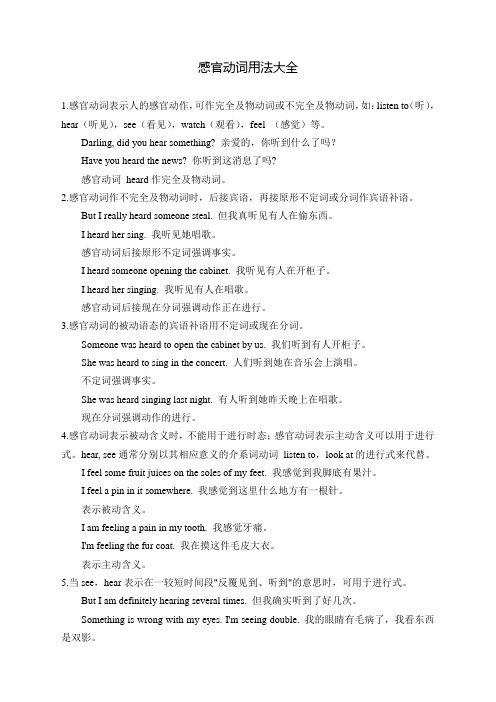
感官动词用法大全1.感官动词表示人的感官动作,可作完全及物动词或不完全及物动词,如:listen to(听),hear(听见),see(看见),watch(观看),feel (感觉)等。
Darling, did you hear something? 亲爱的,你听到什么了吗?Have you heard the news? 你听到这消息了吗?感官动词heard作完全及物动词。
2.感官动词作不完全及物动词时,后接宾语,再接原形不定词或分词作宾语补语。
But I really heard someone steal. 但我真听见有人在偷东西。
I heard her sing. 我听见她唱歌。
感官动词后接原形不定词强调事实。
I heard someone opening the cabinet. 我听见有人在开柜子。
I heard her singing. 我听见有人在唱歌。
感官动词后接现在分词强调动作正在进行。
3.感官动词的被动语态的宾语补语用不定词或现在分词。
Someone was heard to open the cabinet by us. 我们听到有人开柜子。
She was heard to sing in the concert. 人们听到她在音乐会上演唱。
不定词强调事实。
She was heard singing last night. 有人听到她昨天晚上在唱歌。
现在分词强调动作的进行。
4.感官动词表示被动含义时,不能用于进行时态;感官动词表示主动含义可以用于进行式。
hear, see通常分别以其相应意义的介系词动词listen to,look at的进行式来代替。
I feel some fruit juices on the soles of my feet. 我感觉到我脚底有果汁。
I feel a pin in it somewhere. 我感觉到这里什么地方有一根针。
表示被动含义。
- 1、下载文档前请自行甄别文档内容的完整性,平台不提供额外的编辑、内容补充、找答案等附加服务。
- 2、"仅部分预览"的文档,不可在线预览部分如存在完整性等问题,可反馈申请退款(可完整预览的文档不适用该条件!)。
- 3、如文档侵犯您的权益,请联系客服反馈,我们会尽快为您处理(人工客服工作时间:9:00-18:30)。
hear的用法简单归纳如下1.hear作为行为动词听见时,hearsbdosth表示“听到某人做了某事”或“经常听到某人做某事”,hearsbdoingsth.表示“听到某人正在做某事”2.hearabout听说,hearabout+sth听到关於某事物的消息3.hearof+sb./sth听到或知道某人[某事物]的情况4.hearfrom+sb=receivealetterfrom接到某人的来信、电话等5.hear宾语从句:听说或得知(某事物)注意:上句是宾语从句,当that在宾语从句中作连词引导从句时,that可省略。
hearvt.听到,听;听说;审理hearsb可以听见某人说话可以说Icanhearyou1.I'vejustheard______hispromotion.我刚刚听到了他被提升的事。
2.Ihaveneverheard______himsinceheleft.自从他离开后,我再没听到过他的消息。
3.Doyouhear_____youdaughterthisweek今周你有收到你女儿的信吗4.Iheard_______Tomwouldleavehere.我听说Tom会离开这里.5.IthinkIcanhearsomeone______.(knock)6.Janeisgoingtoresign.Iheardher_____.(say)hear的用法简单归纳如下1.后面(that)跟从句,如:IthinkIcandobetterthanyou.变否定句,Idon'tthinkIcandobetterthanyou.2用于摘入语,如:Whodoyouthinkisgoingtospeakatthemeeting3.后面跟代词so,例如:Yes,Ithinkso.No,Idon'tthinkso.4. think+宾语+宾语补足语Hethinkshimselfveryclever.Peoplethinkhimtobeagoodteacher.5. think+wh-词+不定式Theycouldn'tthinkwheretogo.6. think+it(形式宾语)+形容词/名词+不定式/动名词/从句Idon'tthinkitpolitetospeakloudlyinpublic.Ithinkitbestthatyoushouldstayhere.7.有think构成的习惯用语有:thinkabout考虑,想到某人或某事,如:Hewasthinkingaboutamathsproblem.thinkof想,想到,如:Wemustnotthinkonlyofourselves.WhatdoyouthinkofthisT-shirt8.thinkover仔细考虑,如:Hethoughtitoverandrememberedthathehadleranedtheword"plough".9.think还有打算、想到的意思,其后常跟动词不定式,例如:WhenIthoughttoreturn,itwastoolate.10. 关于think的反意疑问句主语是第一人称:Ithinkheisright,isn'the主语是第二,三人称:Theydon'tthinkI'mright,dotheyuse的用法简单归纳如下edtodosth.意为"过去常常做某事",它表示过去经常发生的动作或存在的状态,而现在已不再发生或存在。
这个短语含有今昔对比之意,其否定形式常用usednotto或didn'tuseto。
反意疑问句中应该用did/didn't或used/usedn't。
例如:Iusedto_____inthisriverwhenIwasyoung.我年轻时常在这条河里游泳。
Theyusedto_____goodfriends,_______they他们过去是好朋友,是吗?2.beusedtosth./doingsth.意为"习惯、适应某事/做某事",它表示习惯于某一客观事实或状态,其中to是介词,后面跟名词、代词或动名词;beused可用于多种时态;如强调动作可用get或become替换be。
例如:Oldpeopleareusedto_______upearlyinthemorning.老年人习惯早晨很早起床。
Iwasn'tusedtocitylife,butnowIhavegotusedto________inthiscity.我以前不习惯都市生活,但现在我已习惯住在这座城市了。
3.beusedtodosth.意为"被用来做某事",其中use表"使用"之意,是被动语态形式,to是动词不定式符号。
例如:Woodcanbeusedtomakepaper.树木可以用来造纸。
4.beusedfor...意为"被当做……",其中use表"使用"之意,是被动语态形式。
例如:Theseal'sfurcanbeusedforcoats.海豹皮可当做大衣用。
5.beofuse意为"有用的",其中use是名词,可用形容词来修饰。
例如:Thedictionaryisofgreatusetothestudents.这本字典对学生们很有用。
6.beinuse意为"在使用",其中use也是名词。
例如:Thelaboratoryisinuseuntilthreeo'clock.实验室一直到3点钟都有人使用。
7.makeuseofsth.意为"利用、使用某物",其中use也是名词,可用good,full,more,little等形容词来修饰。
同学们应特别注意它的被动形式。
例如:Wemustmakefulluseoftimetostudy.我们必须充Ⅰ.单项选择。
()1.Thefashionshowis____wonderful____wealllikeit.A.too;toB.so;thatC.such;thatD.very;that()2.—WouldyouliketohavealookatsomepantsTheymayfityouwell.—Well,I’dliketotrythoseblue____.A.pairsB.oneC.pantD.pair()3.Thegirlwantedtomakealotofmoney____shecouldbuythesilkcheongsam.A.andB.butC.sothatD.because()4.Themanis____thanhisfather.A.handsomeB.muchhandsomeC.morehandsomeD.morehandsomer()5.Hisparentsdon’tallowhim____.A.smokeB.tosmokeC.smokingD.smokes()6.—____doyouwear—SizeXL.A.WhatcolorB.HowsizeC.HowmuchD.Whatsize()7.Tomsaidhe____atthattime.A.iscookingB.cookedC.wascookingD.cooks()8.Idon’tknow____.A.wheretheshopisB.whereistheshopC.howcanIgetthereD.howdoyougetthere ()9.Peopleshouldaskthepoliceforhelpwhentheyare____.A.indangerousB.insafetyC.indangerD.insafe()10.Thepolicewomanstoppedthemanfrom____somethingbad.A.doB.doingC.doesD.willdo()11.Isthere____intoday’sshowA.somethinginterestingB.interestingsomethingC.interestinganythingD.anythinginteresting()12.—Excuseme,couldyoutellme____—There’sabankonthesecondfloor.Youcandoitthere.A.whereIcanchangemoneyB.howIcangettothebankC.ifthere’sabanknearhereD.wherethebankis()13.Thereporterwasbusy____thefamousmodel.A.interviewingB.interviewsC.interviewedD.interview()14.Kateisalittlefat.Hermotheradvisesher____clothesindarkcolors.A.wearB.towearC.wearingD.wears()15.Beijingisinthe____partofChina.A.southB.northC.southernD.Northern()16.I'veneverheard____himbefore,however,Isawhimrunningontheplaygroundy esterday.A.fromB.ofC.aboutD.out()17.----Anythingelse----______________A.No,that'sall.B.Sure,thatall.C.OK,I'mfull.D.Itdoesn'tmatter.()18.Waitamoment,please.It____aboutfiveminutestoprepareyourdishes.A.spendsB.costsC.willpayD.willtake()19.Theyreallyneedahouse_______.A.liveB.toliveC.toliveinD.Lived()20.Thinkitoverbefore______importantdecisions.A.tomakeB.makeC.makingD.makesⅡ.情景交际。
(A)根据对话情景选择恰当的选项,其中有两项是多余的。
MissLee—LMr.Zhang—ZL:Hello,Mr.Zhang.WhatareyougoingtodoZ:Ihavefinishedmywork.16L:WouldyouliketogoshoppingwithmeZ:17L:Youknow,myparentsloveTangcostumesverymuch.Iwanttobuysomeforthem. Z:Ihearthereisgoingtobeafashionshowintheshoppingcenter.18L:Goodidea!WhenshallwemeetZ:19L:Bytheway,whatareTangcostumesmadeofZ:20L:Isee.OK.Seeyoutomorrow.Z:Seeyou.(B)根据对话内容填空,补全对话。
